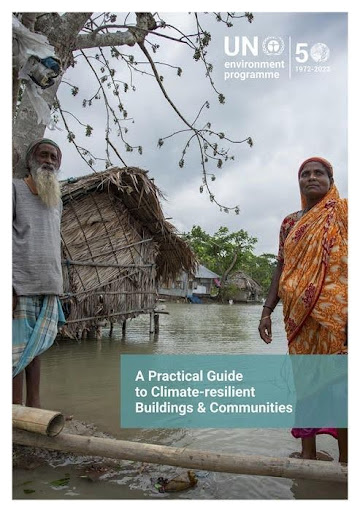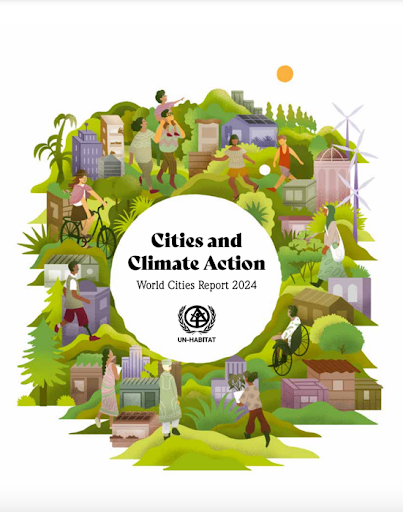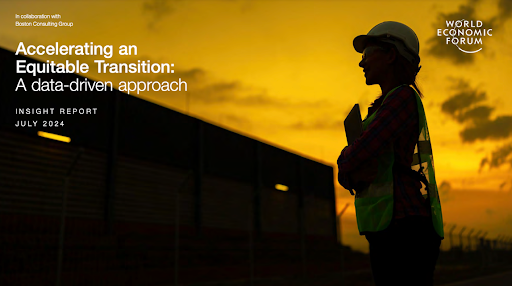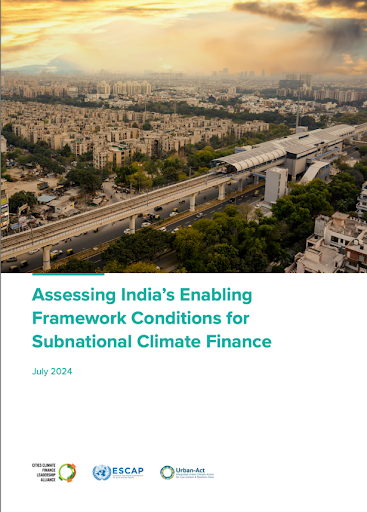
THEME OF THE FORTNIGHT
CLIMATE ACTION AND RESILIENCE
REPORTS
A Practical Guide to Climate-resilient Buildings and Communities

Author(s): United Nations Environment Program (UNEP)
Publication Details: United Nations Environment Programme, 2021
This practical guide demonstrates how buildings and community spaces can be constructed to increase their resilience to climate change, especially in developing countries where structures are largely self-built. The publication provides an overview of the fundamental types of interventions at the building scale, including the use of nature-based solutions. The practical guide offers construction solutions to adapt to a range of different risks in various climates.
Read more: https://wedocs.unep.org/xmlui/bitstream/handle/20.500.11822/36405/Adapbuild.pdf
Cities and Climate Action - World Cities Report

Author(s): United Nations Human Settlements Programme (UN-HABITAT)
Publication Details: United Nations Human Settlements Programme, 2024
The Report provides a wide analysis of the current and expected climate impacts on different regions and cities, as well as the differing vulnerabilities urban populations face as a result of poverty, inequality, ethnicity, gender, disability and other characteristics. Notwithstanding the acute financial and institutional shortfalls many face, this report showcases that cities are leading the way through innovative, community-led approaches that are demonstrating the potential of collaborative, inclusive approaches to climate action. Besides offering a sobering wake-up call on the urgent need to scale up efforts now, various chapters of this report showcases inspiring practices and success stories that can be replicated or adapted elsewhere.
Read more: https://unhabitat.org/sites/default/files/2024/11/wcr2024_-_full_report.pdf
Accelerating an Equitable Transition: A Data-driven Approach

Author(s): World Economic Forum in Collaboration with Boston Consulting Group
Publication Details: World Economic Forum, 2024
This report proposes an architecture of metrics to understand the incidence and severity of multi-dimensional equity implications of the greening of emissions-intensive sectors. Countries are grouped into six country archetypes based on shared structural contexts that can influence the emergence of equity challenges and opportunities in countries. Each archetype has its opportunities and challenges for ensuring an equitable transition. The report applies the metrics architecture to a representative country in each archetype, combining a view on structural opportunities with country and sector-specific metrics that highlight distributional risks within these countries. Combined, these metrics support stakeholders in assessing the relative degree of exposure of workers, consumers, and small businesses to equity risks that different climate mitigation actions can intensify. Evidence-backed strategies, with policy-relevant metrics at the intersection of climate action and socioeconomic inequities can provide a sufficient baseline on risk, generate informed strategies, and ensure climate action serves both people and the planet.
Assessing India's Enabling Framework Conditions for Subnational Climate Finance

Authors: Aanandita Sikka, Arun Krishnan, Eyerusalem Masale and Jessie Press-Williams
Publication Details: United Nations Economic and Social Commission for Asia and the Pacific (ESCAP) and the Cities Climate Finance Leadership Alliance (CCFLA), 2024
The report examines India’s enabling framework conditions (EFCs) for climate finance at the city level, essential for supporting urban climate action. Using the CCFLA/Urban-Act National Assessment Tool, the report assesses four categories critical for subnational climate finance: climate policy, budget and finance, climate data, and vertical and horizontal coordination. Findings highlight India's progress in climate policy and financial autonomy but note gaps in local data collection and intergovernmental collaboration. The report recommends enhancing ULBs' (Urban Local Bodies) access to financing, standardising data practices, and improving multi-level coordination to better mobilize climate finance for Indian cities. Recommendations include expanding city-level climate action plans, boosting fiscal management, fostering public-private partnerships, and promoting green bonds to drive climate resilience across urban India.
RESEARCH PAPERS
Do Cities Have Tools to Meet Their Climate Targets? The Limits of Soft Governance in Climate Action Plans
Authors: Håvard Haarstad, Jakob Grandin, Ronya Reitan Solberg
Publication Details: Elsevier, Cities, August 2024
This paper provides a comprehensive assessment of planned measures in major cities by assessing the distribution of persuasive (soft) versus direct regulatory (hard) and material measures using an urban systems perspective. Examining 1079 climate measures of 19 cities in the global C40 network, this paper finds that most of the measures can be considered as soft measures, focussing on raising awareness, incentivising businesses, engaging citizens, and developing new plans. The cases in this paper suggest that cities in the Global South are more focused on hard and material measures and less prone to voluntarism than cities in the Global North. Generally, showing that strategies for sustainability transformations in cities are heavily reliant on voluntarism and persuasion, the article expresses concern for the ability of cities to meet their ambitious targets.
Read More: https://www.sciencedirect.com/science/article/pii/S0264275124003561
Working Paper - Sustainable Behaviour in Climate Pledges: An Analysis of Top Emitters’ Strategies
Authors: Beth Parkin, Sophie Attwood and Mindy Hernandez
Publication Details: World Resources Institute, October, 2024
This working paper analyses how countries are considering behaviour change within their nationally determined contributions (NDCs). Nine of the most impactful behaviour changes, or “Priority Practices,” based on the research literature are outlined in the paper. These are behaviour changes with the greatest potential to decrease GHG emissions within the food, mobility, and energy sectors. The existing actions are categorised into three broad groups according to the type of behaviour change tool used: enhanced and personalised information; incentives (e.g., monetary or nonmonetary rewards); and improving the decision-making context (e.g., changing how choices are presented, removing barriers to desired behaviours, or altering the physical or built environment that surrounds an individual).
Read More: https://www.wri.org/research/sustainable-behavior-climate-pledges-analysis-top-emitters-strategies
Towards the First Cohort of Climate-neutral Cities: Expected Impact, Current Gaps, and Next Steps to Take to Establish Evidence-based Zero-emission Urban Futures
Authors: G. Ulpiani , N. Vetters , G. Melica , P. Bertoldi
Publication Details: Sustainable Cities and Society, August 2023
Cities are increasingly becoming critical climate actors. However, their preparedness and ambition to forge climate-neutral futures is hard to ascertain. In this study, the Expressions of Interest in the Mission on 100 Climate-Neutral and Smart Cities by 2030, an unprecedented dataset of city inputs to 374 different questions on the transition to (net) zero, is analysed. The article i) delineates emissions baselines, accounting methodologies, and inventories’ completeness (sectors/sources, carriers, gases), ii) analyses emission trends and cities’ capacity to deliver on their climate mitigation commitments, iii) examines the estimated magnitude and origin of residual emissions by 2030 together with the envisioned offsetting strategies, and iv) elucidates gaps, methodological deficiencies, and forms of assistance. Data suggest that if all 362 eligible cities were to reach climate neutrality, approximately 650 MtCO2eq would be removed. However, this would require at least a quadruple effort in half the time compared to current mitigation achievements. Beyond the challenge of emissions baselining, cities lack adequate data collection and monitoring systems and show little familiarity with non-technological and technological avenues to tackle harder-to-eradicate emissions. Capacity building will be key across multiple (e.g., technical, financial, operational) domains to turn ambitious mayoral commitments into factual contributions to climate mitigation.
Read More: https://www.sciencedirect.com/science/article/pii/S221067072300183X
Data-Driven Smart Eco-Cities and Sustainable Integrated Districts: A Best-evidence Synthesis Approach to an Extensive Literature Review
Authors: Simon Elias Bibri
Publication Details: Springer Open - European Journal of Futures Research, 2021
As materialisations of trends toward developing and implementing urban socio-technical and enviro-economic experiments for transition, eco-cities have recently received strong government and institutional support in many countries around the world due to their ability to function as an innovative strategic niche where to test and introduce various reforms.
There are many models of the eco-city based mainly on either following the principles of urban ecology or combining the strategies of sustainable cities and the solutions of smart cities. The most prominent among these models are sustainable integrated districts and data-driven smart eco-cities. Employing a combination of both best-evidence synthesis and narrative approaches, this paper provides a comprehensive state-of-the-art and thematic literature review on sustainable integrated districts and data-driven smart eco-cities. In addition, by shedding light on the increasing adoption and uptake of big data technologies in eco-urbanism, this study seeks to assist policymakers and planners in assessing the pros and cons of smart urbanism when effectuating ecologically sustainable urban transformations in the era of big data, as well as to stimulate prospective research and further critical debates on this topic.
Read More: https://eujournalfuturesresearch.springeropen.com/articles/10.1186/s40309-021-00181-4




